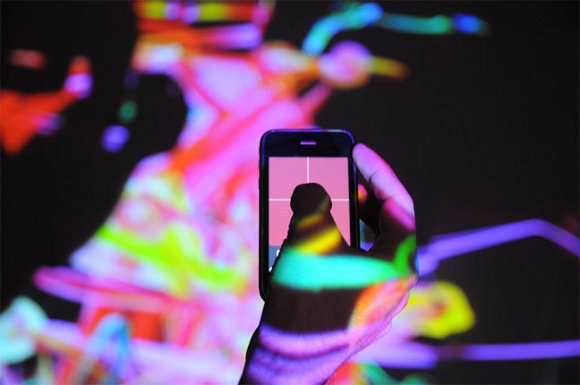For computers, digital tech means the ability to turn anything into numbers. For humans, it means a chance to translate between gestures, ideas, sounds, and images. We can interface with musical, visual creations intuitively and collaboratively – now with ubiquitous, cheap touch and electronics. Two events take on that idea on the two coasts of the US; if you’re nearby, hopefully you can drop by, and if not, we’ll have plenty to share.
Multi-user Art, Networked OSC Workshops in NYC
Here in New York, mobile touch is put to the test in a gallery show in Brooklyn, with two workshops that can help you make your own work. Multi-User Art (image, top) uses the open platform mrmr and OSC protocol to allow visitors with mobile devices to manipulate installations. Step up, and a layout of controls is automatically pushed to your device, so you can push buttons, slide faders, draw, and otherwise control what you see — even with multiple users at a time. (For now, we’re stuck with the iPhone/iPod touch/iPad only, but I’m working on Android and browser-based ports for anyone interested.)
The artwork includes installations by myself, by mrmr creator Eric Redlinger, Superdraw artist Joshue Ott, and, using mirrors and light in place of projection, Chris Jordan. They range from three-dimensional, collaborative drawing to reflected light to moonscapes. The opening is free on Friday night:
But what if you want to learn to harness some of these same tools in your own work? We have two workshops Saturday, too.
Friday, 4/9: Opening, free – 7p; see exhibition information
Saturday, 4/10
11a-12p, free, Eric Redlinger presents an introduction to mrmr, a demonstration of how to use an iPod touch, iPhone, or iPad for control via OSC.
1p-4p, Joshue Ott and I will teach an in-depth workshop on using OSC for networked communication with free tools, focusing on Processing and Pure Data. We’ll talk about how Zeroconf (implemented by Apple as Bonjour) can create zero-configuration, automatic connections – no IP numbers to type. We’ll look at how you can use OSC to make software and hardware communicate across networks, for sound and visuals. And we’ll talk about how you can use tools like mrmr on mobile devices. $75. Class information, signup required!
All information:
Devotion Gallery, Brooklyn
Physical Controls with Arduino, Max, Pd in LA
Touch controls a bit too insubstantial for you? Prefer the tactile feel of a physical encoder in your hand? We’ve got you covered there, too.
Kevin Nelson writes us to share some new events he’s setting up at LA’s new CrashSpace hackerspace. (About time LA got a new, proper hack spot!)
There’s a free workshop Wednesday, using Max (though translating to other environments like Pd shouldn’t be hard), plus a more advanced intensive in May. Details:
First, I’m going to be giving a high-level talk this Wednesday, April 7 at 8pm on using a Monome to control things in the real world by integrating an Arduino with Max/MSP. The talk is free for members of the space, with a $10 suggested donation for non-members.
Flamethrowers! Arduinos! Monomes! This Wednesday, April 7th [CrashSpace]
Second, I’ll be teaching a course on building user interfaces with the Arduino and dataflow languages (I’m trying to make the emphasis on pd because it’s open source, but depending on the audience, Max and Max for Live might slip in there too). The curriculum and description haven’t been posted yet, but should be done and up by the end of the week.
The basic idea of the course is to target musicians who have dabbled in electronics and give them the tools necessary to empower themselves to build their own interfaces and instruments. It’s a two day intensive (8+ hrs/day) on May 15 and 16. We’ll be covering basic electronics & sensors, Arduino programming, serial communication between Arduino and pd/Max, and basic pd patching for midi routing or sound generation. The course is $150 for CrashSpace members, and $250 for non-members, and both prices include an Arduino and selection of sensors & misc components for the project.
What’s the Best Way to Document?
What do you prefer for documentation of these courses, for those of you not in NY or LA who want to follow along at home? (And hey, I can’t be accused of being too specialized geography-wise — I’m teaching a similar course in Portugal this spring.)
I’ve (ahem) sometimes promised more documentation than I’ve actually delivered, but in the meantime, I have been gradually refining some examples in Processing, Pd, and the like, so I’m feeling less shy about sharing them.
Suggestions? The more specific, the more likely I am to implement them. What do you want to see? In what format? Any sites you’ve found useful for this sort of sharing?
The more we can share this sort of specific knowledge, the more we as a community can help each other build our skills.

